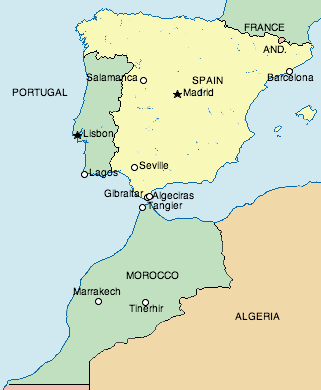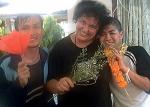Lisbon

Roosters are symbols of Portuguese culture so we felt that it was appropriate that after staying one night in a boring part of Lisbon, Portugal in a hotel room offered to us by a “tout” at a train station we woke to a rooster crowing at 5am.
The next day we moved to a small two star hotel-Residencial Santana Pensao at Rua Luciano Cordeiro-located up a steep narrow side street on a hill at the center of the city in the Bairro Alto district. (“Lets Go” travel book says “Bairro” is the hip name for Chiado-the Portuguese word for district.) The hotel can also be reached via the Ascensor Gloria from Pr. Restauradoes-like the cable cars in San Francisco. The hotel was up one flight of stairs off street-no lift.
We have learned more history on hop-on hop-off tour buses than we did in all of high school and college put together! In Portugal there is a law against killing the bull in bullfights-and the horse plays a very important role. In 1965 my traveling companion and I saw a bullfight in Pamplona Spain when we were there for the running of the bulls (that Hemingway made famous in the US). It was a sickening thing to watch and we left in the middle before the bull died.
As Bob says, Lisbon has some degree of decay but perhaps that is the charm-by its appearance we realize that it’s hey-day was 4-5 centuries ago. Amazing to think that at one time Portugal was one of the foremost powers of the world! One of the monuments of Lisbon is a huge building that was built as a seminary and church with 15% of the profits that came from the spice trade in India. It is now called the “pepper building.”
Next day, after a lunch of very good chicken and rice and a sandwich of beef slices cooked in broth, we strolled out into an empty square in the rain. I was offered contraband from a guy selling sun glasses…sunglasses in the rain?
Was helped at internet by young woman who was fluent in English. (Very difficult to find anyone over the age of 20 that knows English. This girl, however, had had 8 years of English and told us that all children from first grade on are now taught English in school.)
Ate dinner at restaurant around the corner with Fado Music. Fado is Portuguese old style blues which is a kind of high-pitched lamenting. I had heard that Fado was very beautiful and that the singing would break your heart but I didn’t like the classical version-very loud and harsh singing and then they want to sell you their CDs afterward. Have been told the contemporary Fado is better. The next day we took a train trip to Caicais on the outskirts of Lisbon.
On the last day we took the tram up to the Alfama district-old Moorish district of town-lots of Muslim shop owners. We visited a church that was displaying “Order of Malta” artifacts and we remembered reading about the order in a college history or religion class. We trekked up a steep hill in the rain to the Castile de Jorge, an old Roman fortification, and I took a pee into a little waterfall (urinal) against the fortification wall behind a copper shield with my stand-up peeing device used by women in the US Forest Service.
Sampled port wine (the indiginous favorite in Portugal) in a shop across from the wall with a young woman proprietor who spoke very good English. When my port was finished I told her thank you in Portuguese and she said “that is Portuguese for thank you.” I said, “yes, I know, I am thanking you for the port.” She laughed and said, “oh, sorry, many people say gracias (Spanish) and we find it very insulting!” Bob and I do seem to “get into trouble” on a pretty regular basis with the locals but we were lucky that time. Bob remarked to her that he noticed that she had an American accent. She said that yes, her English teacher from Britain gave her low marks in English class because of her American accent but that she didn’t care!
On the way down the hill, soaked wet and freezing cold, we looked into a small restaurant window and saw a huge pile of crab on the counter with a table full of people eating and laughing loudly-the entire scene pulling us uncontrollably in where we participated in the festivities.
Tags: Culture, Europe, Europe, Hotels,Hostels & Guesthouses, Lisbon, Portugal

